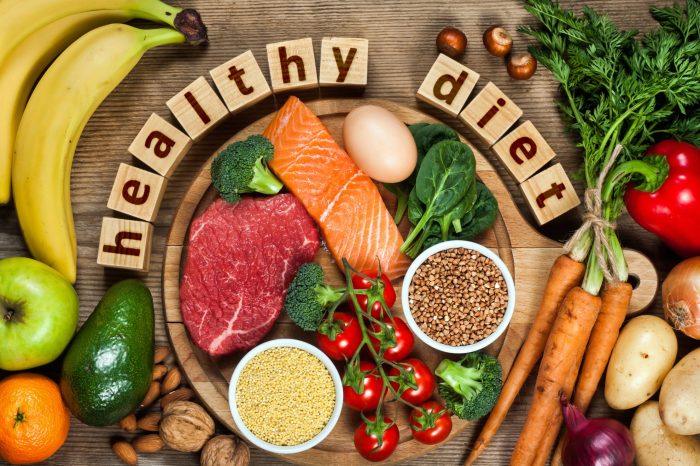Balanced diet, the cornerstone of a healthy lifestyle, is not just a trend but a necessity for overall well-being. Dive into the world of nutritious eating, where every bite counts towards a vibrant life.
In this article, we will explore the definition, benefits, components, tips, and debunk common myths surrounding the concept of a balanced diet. Get ready to revolutionize your eating habits!
Definition of a Balanced Diet
A balanced diet refers to a way of eating that provides all the essential nutrients needed for good health in the right proportions. It is crucial for maintaining overall health and well-being.
Key Components of a Balanced Diet
A balanced diet consists of:
- Macronutrients: These include carbohydrates, proteins, and fats, which are essential for energy production and cell function.
- Micronutrients: Such as vitamins and minerals, play a vital role in various bodily functions, including metabolism and immunity.
- Fiber: Important for digestive health and helps in maintaining a healthy weight.
Examples of Foods in a Balanced Diet
Some examples of foods that make up a balanced diet include:
- Fruits and vegetables: Rich in vitamins, minerals, and fiber.
- Whole grains: Provide essential carbohydrates and fiber.
- Lean proteins: Such as chicken, fish, and legumes, offer necessary amino acids for muscle growth and repair.
- Dairy or dairy alternatives: Important sources of calcium and vitamin D for bone health.
- Healthy fats: Found in avocados, nuts, and seeds, essential for brain function and hormone production.
Benefits of a Balanced Diet

Maintaining a balanced diet comes with a plethora of benefits that impact both physical and mental health, as well as overall well-being.
Physical Health, Balanced diet
- Provides essential nutrients: A balanced diet ensures that your body receives all the necessary vitamins, minerals, and nutrients it needs to function optimally.
- Boosts immune system: Eating a variety of foods helps strengthen your immune system, making you less susceptible to illnesses and infections.
- Improves digestion: Foods rich in fiber, such as fruits, vegetables, and whole grains, promote healthy digestion and prevent digestive issues.
Mental Health and Cognitive Function
- Enhances mood: Nutrient-dense foods have been linked to improved mood and mental well-being, reducing the risk of depression and anxiety.
- Sharpens focus: A balanced diet rich in antioxidants, omega-3 fatty acids, and vitamins can enhance cognitive function, memory, and concentration.
- Reduces risk of cognitive decline: Certain nutrients in a balanced diet have neuroprotective effects, lowering the risk of cognitive decline and neurodegenerative diseases.
Weight Management and Disease Prevention
- Controls weight: Consuming a balanced diet with appropriate portion sizes can help manage weight by providing the right amount of calories for energy needs.
- Reduces risk of chronic diseases: A diet high in fruits, vegetables, whole grains, and lean proteins can lower the risk of chronic conditions such as heart disease, diabetes, and cancer.
- Regulates blood sugar levels: Eating a balanced diet can help stabilize blood sugar levels, reducing the risk of diabetes and managing existing conditions.
Components of a Balanced Diet

Eating a balanced diet means consuming a variety of foods that provide essential nutrients to support overall health and well-being.
Importance of Carbohydrates, Proteins, Fats, Vitamins, and Minerals
Carbohydrates are the body’s primary source of energy, providing fuel for daily activities. Proteins are essential for building and repairing tissues, such as muscles, skin, and hair. Fats play a crucial role in absorbing vitamins and maintaining cell function. Vitamins and minerals are necessary for various bodily functions, including immune system support and bone health.
Incorporating Fruits and Vegetables
Fruits and vegetables are rich in vitamins, minerals, and antioxidants, making them essential components of a balanced diet. Aim to include a variety of colors and types in your meals to ensure you’re getting a wide range of nutrients. Try adding fruits to breakfast, snacks, or desserts, and incorporate vegetables into your main meals and side dishes.
Protein Sources and Healthy Fats
Protein sources include lean meats, poultry, fish, eggs, dairy products, legumes, nuts, and seeds. Opt for lean cuts of meat and poultry, and choose plant-based proteins like beans and lentils for a healthier option. Healthy fats can be found in foods like avocados, nuts, seeds, olive oil, and fatty fish. These fats help support brain function, hormone production, and overall heart health.
Tips for Achieving a Balanced Diet
To maintain a balanced diet, it’s essential to plan and prepare meals mindfully. Here are some practical tips to help you achieve a balanced diet:
Meal Planning and Preparation
- Plan your meals in advance to ensure you include a variety of food groups.
- Use fresh ingredients and limit processed foods high in added sugars and unhealthy fats.
- Cook at home more often to control portion sizes and ingredients used in your meals.
Portion Control and Mindful Eating
- Avoid eating in front of the TV or computer to focus on your meal and prevent overeating.
- Use smaller plates to help with portion control and avoid serving oversized portions.
- Eat slowly and savor each bite to allow your body to recognize when it’s full.
Healthier Food Choices
- When eating out, opt for grilled, steamed, or roasted dishes instead of fried options.
- Choose water or unsweetened beverages over sugary drinks to reduce empty calories.
- Read food labels when grocery shopping to make informed choices about the nutritional content of products.
Common Misconceptions about Balanced Diets
There are several myths and misconceptions surrounding the concept of a balanced diet. Let’s debunk some of these misunderstandings to help you make informed choices about your nutrition.
Carbs are always bad for you
Carbohydrates often get a bad rap, with many people believing that all carbs are unhealthy. However, not all carbs are created equal. Whole grains, fruits, and vegetables are excellent sources of healthy carbohydrates that provide essential nutrients and fiber.
It’s important to focus on complex carbs and avoid processed and refined carbs, such as sugary snacks and white bread, which can lead to spikes in blood sugar levels.
Skipping meals helps with weight loss
Some individuals believe that skipping meals, especially breakfast, can aid in weight loss. However, skipping meals can actually slow down your metabolism and lead to overeating later in the day.
It’s crucial to fuel your body with regular, balanced meals and snacks to maintain stable energy levels and support your overall health.
All fats are unhealthy
Another common misconception is that all fats are bad for you. While saturated and trans fats should be limited in a healthy diet, unsaturated fats, such as those found in avocados, nuts, and olive oil, are beneficial for heart health.
Incorporating healthy fats into your diet in moderation can help reduce inflammation, improve cholesterol levels, and support brain function.
